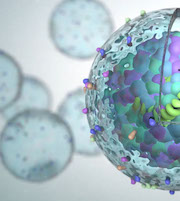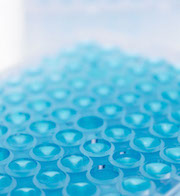ReNeuron’s human retinal progenitor cell (hRPC) programme for blindness-causing diseases of the retina has been developed through a collaboration with the Schepens Eye Research Institute Massachusetts Eye and Ear, an affiliate of Harvard Medical School in Boston, USA and a world-renowned clinical centre for the treatment of retinal diseases. The hRPC programme currently focuses on the inherited retinal disease, retinitis pigmentosa (RP). RP is a hereditary diseases of the eye that lead to progressive loss of vision due to cells in the retina becoming damaged and eventually dying. There is also the potential to expand the ophthalmology programmes into cone rod dystrophy (CRD) as part of a broader strategy to evaluate the efficacy of the hRPC therapeutic candidate across a range of genetic diseases of the eye.
In RP, there is a progressive loss of rod cells in the periphery of the retina causing night blindness that leads to loss of peripheral vision, and ultimately tunnel vision. In contrast, CRD is associated with a loss of cone cells in the retina that initially results in deterioration of central visual acuity and colour vision.
Proprietary human retinal progenitor cells are used as the basis of the programme. Pre-clinical studies carried out in disease models by the Company’s academic collaborators have demonstrated that, when transplanted into the retina, the retinal progenitor cell technology has the potential to preserve existing photoreceptors, potentially reducing or halting further deterioration of vision. In addition, the progenitor cells have been shown to mature into functional photoreceptors that engraft into the photoreceptor layer, bringing the possibility of restored vision.
ReNeuron’s hRPC stem cell therapy candidate for RP benefits from Orphan Drug Designation in both Europe and the US. The Company has worked with world-leading collaborators and academic institutions in the retinal disease field to successfully take the retinitis pigmentosa programme through pre-clinical development.
ReNeuron has completed enrolment in a Phase 1/2a clinical trial in the US, UK and Spain with its hRPC therapy candidate for RP. The trial design is an open-label, dose escalation study to evaluate the safety, tolerability and preliminary efficacy of the hRPC stem cell therapy candidate in patients with advanced RP. The method of administration of the hRPCs is via sub-retinal injection. The primary endpoint of the study is safety, with patients now being followed up for 24 months post-treatment with monitoring including measurements of visual acuity.
The Company has previously reported positive preliminary data in the initial Phase 2a segment of the study. In 2020 the Company received regulatory approval to expand the Phase 2a study in both the US, the UK and in Spain.
An exclusive licence agreement has been signed with Fosun Pharma for the development, manufacture and commercialisation of the hRPC programme in the People’s Republic of China.
Following a review of the latest data the Company intends to out-license its RP programme assets (outside of China) following completion of the current clinical data package for the ongoing phase 1/2a clinical trial.


